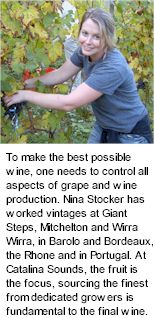


At Catalina Sounds, the fruit is the focus - sourcing the best possible from passionate growers in Marlborough is fundamental for all the varietals. The winemaking techniques are very non-interventionalist, the fruit must be allowed to express itself. The wines are meant to be food-friendly, and not over-the-top. Subtle, elegant wines are what Catalina Sounds strive to produce.

Nina Stocker was born in Basel, Switzerland close to the famous Alsace wine region of France. Her father was very interested in viticulture and became involved in a tiny vineyard near the village. Family weekends and holidays were often spent in picturesque wine regions of France and Northern Italy. Following their return to Australia in 1987, the Stockers planted Cabernet Shiraz and Merlot on the rolling ironstone hillside near Tallarook in Central Victoria.
During Nina's Science /Arts degree at Monash University where she majored in microbiology, immunology, and history, she was fortunate to have an opportunity to do some work experience as a cellar hand for Don Lewis at Mitchelton, followed by a vintage at Wirra Wirra. Nina decided she wanted to further her studies in Oenology at Adelaide University.
She gained further experience through vintages in Barolo in Northern Italy, Bordeaux, the Northern Rhone and in Portugal. Nina worked as an assistant winemaker at Giant Steps in the Yarra Valley with Steve Flamsteed and Team for three years, fuelling her passion for cool climate wines, especially Pinot Noir.
Marlborough has interested Nina since the days of working in a bar while at university. She was always being asked by customers for a Marlborough savvy. She developed a fascination for this popular style of wine, and discovered that a diversity of wine styles and varieties were also grown there. The unique cool climate, abundant sunshine and plethora of sub-regions in spectacular surroundings all conspired to convince Nina that this was where she wanted to live and make wine.
Catalina Sounds is a proud supporter of Pink Hope, looking after young women affected and at a high risk of breast and ovarian cancer.






















